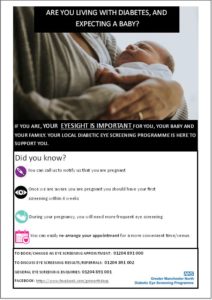Why should I have retinal photographs during my pregnancy?
Pregnancy can sometimes cause rapid progression of diabetic retinopathy, a condition affecting small blood vessels in the retina. Retinal photographs can detect these changes early and ensure prompt referral if you need treatment.
Who is at risk of getting worsening retinopathy during pregnancy?
Nearly four out of ten people with diabetes have some retinopathy, usually mild.
Women who already have retinopathy, poor diabetic control or a history of recent poor control are at greater risk. The more severe the retinopathy is at the start of the pregnancy, the greater the chance of it worsening. In some cases, these changes need laser treatment.
Rapid improvement in diabetic control (which may be necessary for you or your baby’s health) and high blood pressure (including high blood pressure with the pregnancy) may also be associated with worsening of retinopathy.
What can I do to help prevent my eyes from deteriorating during my pregnancy?
You can reduce the chance of any retinopathy developing or progressing by keeping good control of your diabetes and blood pressure and not smoking during your pregnancy.
I have my annual screening retinal photographs so why do I need to have extra pictures during my pregnancy?
Retinopathy can deteriorate rapidly during pregnancy, so it is important to have pictures taken during each trimester to pick up any changes promptly.
I had no retinopathy at my last screening photographs. Am I likely to develop sight-threatening problems during my pregnancy?
If you have no retinopathy, have good diabetic control in the past and during the pregnancy, and have a low HbA1c then the chances of developing severe problems during your pregnancy are low.
I had mild background diabetic retinopathy at my last screening photographs. What does this mean for my pregnancy?
You need to have retinal photographs taken in each trimester of your pregnancy to look for any worsening. Background retinopathy will show a few more changes in half of pregnant women with diabetes but improves afterwards. If the retinopathy progresses significantly, you will be referred to an ophthalmologist (a specialist eye doctor) for further assessment.
I am under the care of an ophthalmologist (a specialist eye doctor) for diabetic eye disease. What should I do now I am pregnant?
Please contact your ophthalmologist and inform them that you are pregnant, you will need to be seen three times during your pregnancy and shortly after delivery.
Can diabetes and pregnancy affect the eye in other ways?
Pre-existing eye disease may be worsened or helped by pregnancy. Discuss this with your eye specialist or diabetes doctor. Some women find they are intolerant of contact lens wear during pregnancy.
Drops are sometimes used to dilate the pupils during retinal photography and for assessment and treatment by the ophthalmologist. Is this safe during pregnancy?
Local anaesthetic and dilating drops are not harmful to the baby so can be used safely.
How is diabetic retinopathy treated and is this safe during pregnancy?
Diabetic retinopathy is treated with laser. This is safe to perform during pregnancy.
What should I do now?
You can contact the Greater Manchester North Diabetic Eye Screening programme via the number below. They will arrange appointments for photographs to be taken in each trimester at a location convenient for you. If you are under the care of a Hospital Eye Service, please let them know you are pregnant so that they can arrange for you to be seen regularly. It is important you keep your appointments to have your eyes checked.

